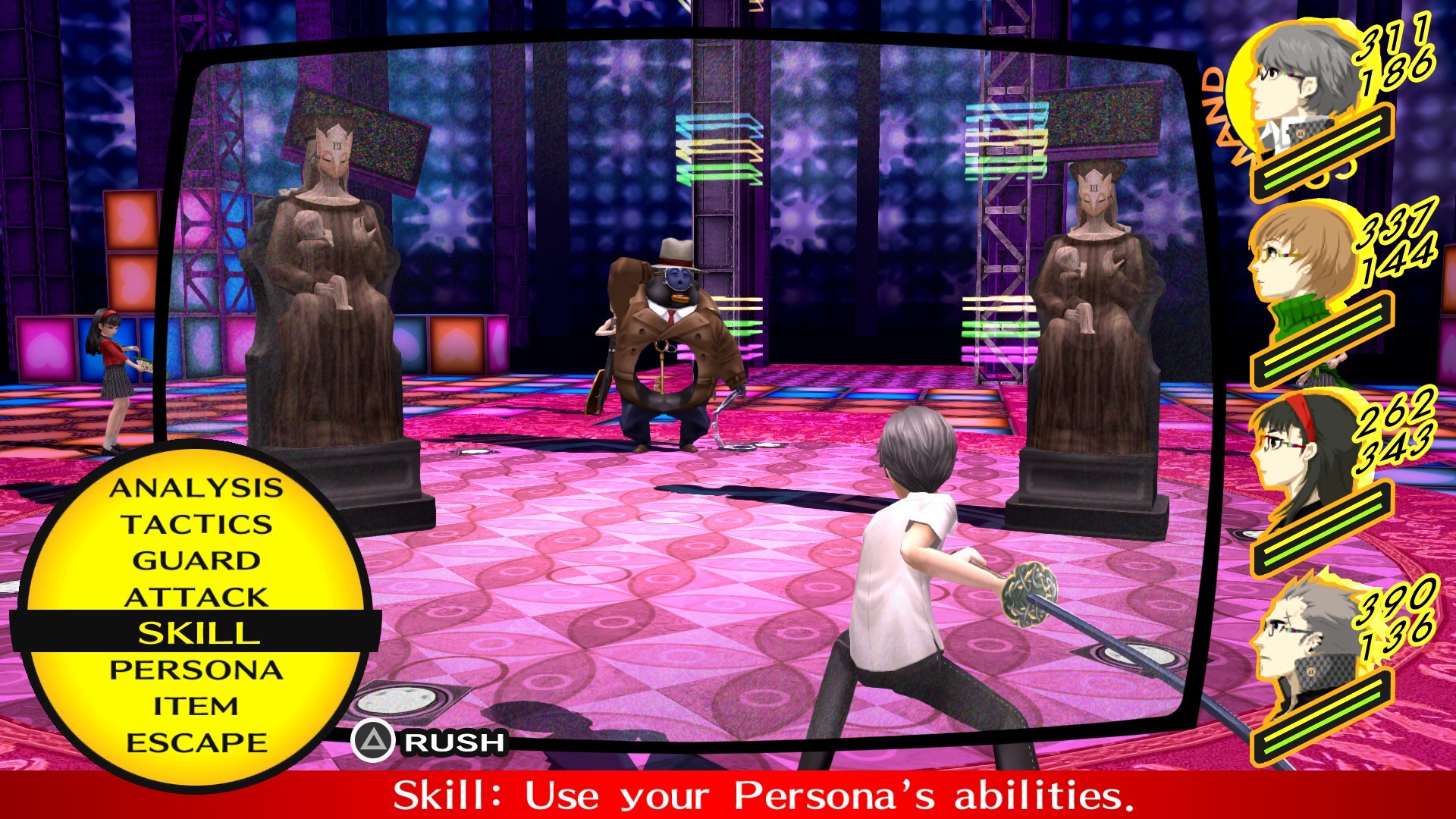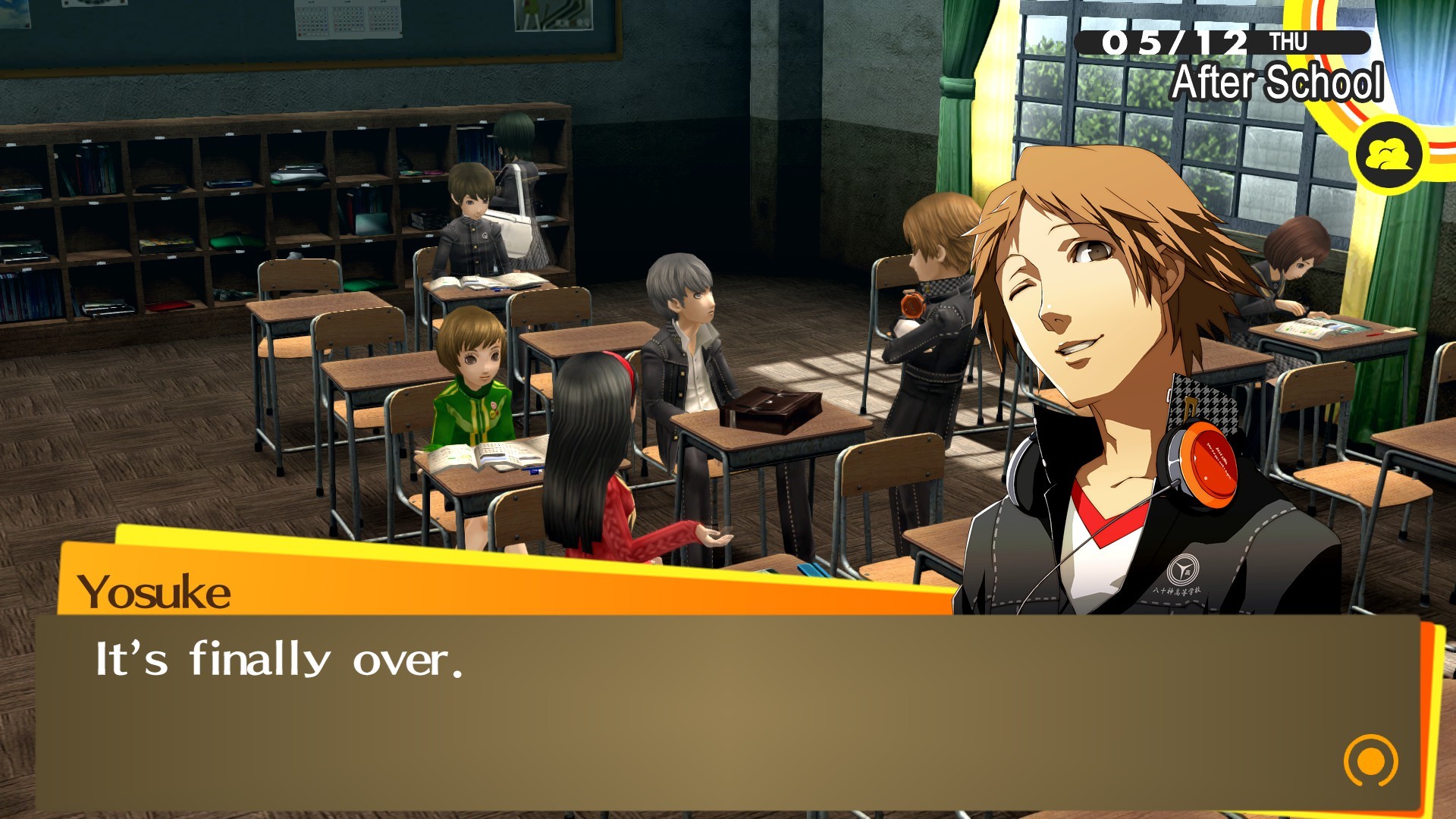Persona 4 Golden review: The game you know and love, now everywhere

What is there left to say about Persona 4? For fifteen years, critics and fans alike have been singing its praises, often calling it the best Persona game, and sometimes even the best JRPG, on the market. It’s neither of those things (Persona 3 is still the better game overall, and the best JRPG is Dragon Quest VIII), but it’s still fantastic – even the fourth time around.
Fans who’ve only dipped their toes into the series with Persona 5 might be a little surprised at how quaint Persona 4 feels. Set in the small Japanese country town of Inaba, Persona 4 tells the story of the player-named protagonist as he stays with his family while his parents are abroad.
Unlike Persona 5, there’s no dark secret haunting our protagonist’s past – no criminal history, no suspicious circumstances. You’re just a regular, everyday guy who’s staying with his uncle for a while, making friends, and hanging out after school.
Of course, it’s a Persona game, and as a Persona game, things get a little bit out of hand when a mirror dimension shows up inside people’s televisions, and corpses start appearing, dangling from transmission towers. Nothing is ever as simple as it should be, hey?
Our protagonist, alongside a few friends from school and a talking mascot costume (don’t question it, it’s fine), finds a way to enter the television realm and discovers that these people are being killed by shadows formed from repressed emotions.
That’s the basic setup, and it’s a good starting point for a decent story. There’s some subtlety to how Persona 4 approaches its themes of overcoming and accepting the self, with some lovely, touching moments throughout that make it overall worth playing for the story alone.
But it’s not always as subtle and nuanced as it perhaps should be, often acting as more of a chainsaw than a scalpel in getting its story across. There are also some outdated depictions of femininity, and a few moments here and there that border on outright homophobia. That’s a trend that was followed through to Persona 5, so it’s difficult to chalk it up entirely to Persona 4 being a product of its time. It sucks when these moments pop up, but they’re not particularly frequent, and they don’t last long, so they’re easy to move past.
Where Persona 4 really shines is its combat. Persona 5 players will feel very familiar here, as it’s more or less exactly the same in terms of how battles play out. It’s a slick, sensible, and satisfying turn-based combat system that asks players to think about how they want to approach each battle and come up with strategies for each encounter.

Granted, as you move through the game, most regular encounters will blend together: hit weaknesses, go for an all-out attack, and move on. You can choose to spice things up with harder difficulty settings though, and these can make every fight feel like a boss battle. This drags what would be a fairly reasonable 60-hour experience out to 80 or even 100 hours, but anyone looking for a challenge probably isn’t too concerned about how long that challenge is going to take.
Of course, players who just want a breezy time through the game can also just opt to chuck the game on Very Easy and blast their way through every encounter. That’s a fun way to play too, because unlike some other easy modes (looking at you, SMT V), it doesn’t just make you an invincible god — it makes things easier, not easy, and that’s the right way to go about it.
Players who are having a tough time can also change the difficulty setting on the fly – a nice addition to this version of Persona 4 Golden that was only previously available in the Steam version. If you’re finding things a little too easy, you can bump the difficulty up a level, or if you’re finding a boss impossible to get past, you can drop it down and get through it.
There’s also the social aspect of the game, which has you finding ways to effectively spend your time while you’re not dungeon crawling. If I’m being honest, this is my least favorite part of Persona games, because there’s always so much to do, and most of it is important.

Do you spend the day with Yosuke so he becomes stronger in battle, or do you spend the afternoon studying to improve your knowledge stat? It might seem like buffing up Yosuke is the right choice there, but maxing out your knowledge unlocks an even more important social link later on. It’s this kind of opaque decision-making that makes the social aspects of Persona 4 Golden stressful for me, but I’m sure there are many others out there who love this about the game.
In terms of the port itself, it’s incredibly solid. It looks and runs perfectly on both Xbox and Switch, and I’m sure it’s just as great on PlayStation. There are very few changes present between the prior Steam version of the game and this new version, with the exception of the option to quick save, which lets players exit out of the game and pick up where they left off at any time.
At the end of the day, this is still just Persona 4 Golden. Sure, it’s the best version of Persona 4, but a lot of that legwork was done in the Steam port, so it’s hard to really give much credit to this. Still, Persona 4 Golden is a great game with a wonderful soundtrack and a combat system that absolutely rules, which makes it worth playing (or replaying) for any Persona fan.
Score: 8/10
Version tested: Xbox Series S.
